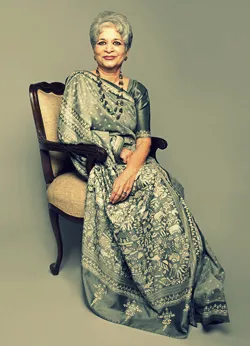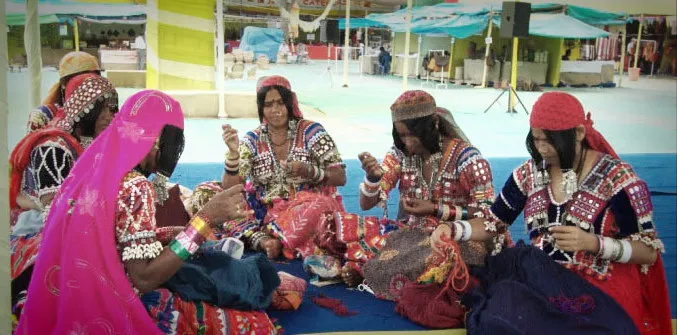Laila Tyabji, Dastkar: The guardian of Indian arts & crafts for three decades

“Staying in Indian metros and abroad, it is easy for any artisan or designer to question the substandard quality of artwork being produced by the rural craftsmen. While we are all lost in admiring the glorious artwork of the historical era, we certainly miss out on the fundamental point that today’s craftsmen in rural areas do not even have the means to earn a livelihood, forget the apt environment for working.” Laila Tyabji, the face of Dastkar for over three decades, pointed out the general perception about handicrafts when YourStory caught up with her recently for an interview.
There are over 7 million artisans in rural India engaged in crafts, the backbone of non-farm rural economy of the country (Source: “Crafting a livelihood” report by Dasra). Women struggling to enter the economic mainstream in these areas use craft to gain their social and financial freedom, if they have access to the market. Addressing this, Dastkar was founded in 1981 to help craftspeople, especially women, to use their own traditional craft skills as a means of employment, income generation and economic self-sufficiency. Renowned crafts scholar and chairperson of Dastkar, Laila Tyabji has steered the organization to the glory since its inception. Apart from revolutionizing the crafts industry, Laila is well known for her bohemian outlook, outspokenness and most of all, for her inimitable style, which has made her a famous proponent of the sari.
“An experience which changed my life forever”
Laila Tyabji’s connection with design was scripted right from her college days. After finishing her studies in fine arts from Japan, Laila came back to Delhi only to realize that it was not an easy going for a freelance designer in those days, mostly due to the lack of opportunities and resources in fashion, interior design, graphic design or even stage design industry. Though she has always enjoyed working with traditional Indian handicraft, it was an assignment in Kutch (Gujarat) which, she says, changed her life forever. There she met rural artisans and understood their problems. Laila recalled, “how could have we expected these people (rural artisans) to work when there was clearly no one to market their artwork? We needed to support them in order to see the result of their beautiful work in the market. That’s how I decided to bring people together to form Dastkar.”

“Problem much bigger than government’s role in it”
Commenting on the role of the government in providing support to the handicrafts sector, Laila said, “I do have a problem, but it’s much bigger than government’s role. India is a large developing country with over 23 million unorganized craftsmen, more than that of any other nation. We should invest in these craftsmen.” She supported the presence of commercial players like FabIndia because more than anything, they are an answer to the dearth of marketing as rural people can’t set up the stores themselves.
“It’s not a gender-biased industry”
Artisanship is a family activity; some specific works are done by men while a few others by women. It’s not a gender-biased industry. As someone who has been working in the handicrafts sector, Laila believes that even in terms of opportunity she hasn’t faced any discrimination being a woman. However, she accepts that the situation would have been different if she was aspiring to be an aeronautical engineer or a fighter pilot.
“I am 66 and still jump out of my bed every morning”
Speaking about her motivation and what keeps her going every day, Laila said: “I am 66 (years old) and still jump out of my bed every morning to work. Probably it is the double satisfaction of:
- Working with beautiful arts and crafts all the time;
- Knowing that by your work you are changing the life of someone and giving them a source of income.

Laila has a piece of advice to aspiring women entrepreneurs and designers: “When you are deciding to be an entrepreneur or choosing your profession, look at the crafts sector as well. It is a unique opportunity where you do not have to compete with many players, and you will always have the double satisfaction of your work as well as that of lending a hand to the needy.”







